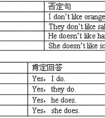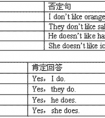句型转换。1. I think you are right.(改为否定句)I__________ __________ __________ __________ right.2. My favorite movie star is Jackie Chan.(对画线部分提问)_-七年级英语
Whose is better? 谁的好一些?
Which of these is yours? 哪一本是你的?
2)宾语:
What do you mean? 你是什么意思?
Which do you like better? 哪一个你更喜欢一些?
Whose have you chosen? 你选了谁的?
3)表语:
What’s her name? 她叫什么名字?
Whose is it? 这是谁的?
4)定语(这样用时有些字典标作形容词):
What time does the train leave? 这列火车什么时候离开?
Which room shall we stay in? 我们住哪间房?
Whose passport is this? 这是谁的护照?
考点名称:形容词的比较级,形容词的最高级
- 形容词的比较级:
当两种物体之间相互比较时,我们要用形容词或副词的比较级;
当相互比较的物体是三个或三个以上时,我们就要用形容词或副词的最高级。 形容词的比较级和最高级的特殊变化规则:
一、少数单音节词前面加 more-, most- 构成比较级和最高级
tired ---- more tired , most tired
fond ----- more fond , most fond
glad ----- more glad , most glad
bored ---- more bored , most bored
pleased---- more pleased , most pleased二、不规则变化
good /well------- better ,best
bad/badly/ill------ worse , worst
many/much-------more , most
little ------ less , least
far ---- farther, farthes / firther , furthest
old ---- older , oldest (GA)
---- older , oldest / elder , eldest (GB)三、下列形容词和副词的比较级和最高级有两种形式
cruel----- crueler, cruelest /more cruel , most cruel
strict---- stricter , strictest /more strict , most strict
often----- oftener , oftenest / more often , most often
friendly------ friendlier , friendliest / more friendly , most friendly
clever----- cleverer, cleverest / more clever , most clever四、下列形容词和副词没有比较级和最高(即表示”最高程度”或”绝对状态”的形容词和副词没有比较级和最高级)
empty , wrong , perfect , unique , extreme , excellent , favourite (GB)/ favorite (GA) , true , right , correct , extremely ...- 形容词的比较级和最高级用法:
形容词比较等级用法:
1.没有比较对象时,用原级。
I have a new computer.
2.两者比较,程度相同。
A+系动词+as+adj.+as+B.
Our school is as beautiful as theirs.
3.两者比较,程度不同。
A+系动词+not as+adj.+as+B.
The weather here is not as hot as that in the south.
4.A比B更…
The earth is bigger than the moon.
5.比较级前可以用much,even,still,far,a lot,a little,a bit,any等修饰。
Your room is much bigger than mine.
I’m a little shorter than her.
6.用比较级可以表示最高级含义:
John is stronger than any other boy in his class.=John is stronger than any of the other boys.
两者不属于同一范畴,不能用other.
Chongqing is bigger than any city in Sichuang.
7.“比较级+and+比较级” 表示“越来越…”
China is becoming more and more beautiful.
Days are getting longer and longer.
8.用the+比较级,the+比较级 表示”越…就越…”.
The busier he is, the happier he feels.
9. Which/Who+is+比较级 A或B?
A和B哪一个/谁更…?
Which is better,this one or that one?
最高级用法:
表示三者或三者以上的人或物的比较,一个在某方面超过其他两个或多个时,用最高级,结构是
主语+系动词+the+形容词最高级+of/in短语。
This story is the most interesting of the three.
1. one of the+形容词最高级+名词复数
它的意思是最…之一。
English is one of the most important languages in the world.
2. which/who…+is+形容词最高级
“…最...”
Which is the heaviest,the horse,the sheep or the elephant?
3.最高级前可以用序数词
The Yellow River is the second longest river in China. - 形容词的比较级和最高级的变化规则:
构成
原级
比较级
最高级
一般加er,est
tall
taller
tallest
以字母e结尾只
加 r,stlarge
larger
largest
以一个辅音字母结尾的
重读闭音节,双写这一辅
音字母后再加er,estred
redder
reddest
hot
hotter
hottest
thin
thinner
thinnest
以辅音字母+y结尾的词,
将y变为i再加er,esteasy
easier
easiest
happy
happier
happiest
ugly
uglier
ugliest
early
earlier
earliest
其他双音节词和多
音节词,在词前
加more或mostinteresting
more interesting
most interesting
考点名称:疑问副词
- 疑问副词:
用来引导特殊疑问句,表示时间,地点,方式,原因等。
常见的有:when,where,how,why等。 疑问副词的用法:
1.疑问副词是问何时、何地、如何、因何的副词,主要有when, where, how, why。
2.疑问副词用在句首。
How long have you been staying in America?
你在美国待多久了?3.疑问副词在句中引导名词子句。
I want to know where she has gone.
我想知道她去哪里了。4.疑问副词后接不定词构成的名词片语,在句中可以作主词、受词或主词补语。
How to solve the problem gives him a bad headache.
如何解决这个问题使他伤透脑筋。
(How to solve the problem作主词。)
I don't know how to answer the question.
我不知道如何回答这个问题。
(how to answer the question作受词。)
The patient is in urgent need the medicine, but the problem is where to get it.
这个病人急需这种药,但问题是哪里能找到。
(where to get it作主词补语。)5.疑问副词引导的名词子句可作主词、受词或主词补语。
When we are to start the competition hasn't fixed yet.
我们什么时候开始比赛还没有定下来。
(When we are to start the competition作主词。)
She asked her husband where he had been.
她问她丈夫去哪里了。
(where he had been 作受词。)
The question is when we can finish our work.
问题是我们何时能完成我们的工作。
(when we can finish our work作主词补语。)- 疑问代词与疑问副词的区别:
1. 疑问代词做对陈述句的主语,宾语或定语提问,即做句子的主语,宾语或定语,如what, who/ whom, whose.
- 最新内容
- 相关内容
- 网友推荐
- 图文推荐
| [家长教育] 孩子为什么会和父母感情疏离? (2019-07-14) |
| [教师分享] 给远方姐姐的一封信 (2018-11-07) |
| [教师分享] 伸缩门 (2018-11-07) |
| [教师分享] 回家乡 (2018-11-07) |
| [教师分享] 是风味也是人间 (2018-11-07) |
| [教师分享] 一句格言的启示 (2018-11-07) |
| [教师分享] 无规矩不成方圆 (2018-11-07) |
| [教师分享] 第十届全国教育名家论坛有感(二) (2018-11-07) |
| [教师分享] 贪玩的小狗 (2018-11-07) |
| [教师分享] 未命名文章 (2018-11-07) |


![How much does it ______ to fly from Yancheng to Hainan Island?[ ]A. cost B. payC. spend D. take-七年级英语](http://www.00-edu.com/d/file/ks/4/2/shiyidongci/2020-01-05/small7dcf2f05998de63e10cc3629787031c81578210087.png)

![He always _____TV in the evening. He _____ listening to the radio. [ ]A. watch, don't like B. watches, doesn't like C. watching, don't like D. watch, do-七年级英语](http://www.00-edu.com/d/file/ks/4/2/shiyidongci/2020-01-05/small45d599b4a60b84e61cec210bfbf051f51578214524.png)
![I'd rather ___ to the Mcdonald's Restaurant because I like to listen to quiet music.[ ]A. to go B. going C. go D. went-八年级英语](http://www.00-edu.com/d/file/ks/4/2/shiyidongci/2020-01-05/small1767bba1727fef2c035c53dcbd9bc20e1578209517.png)
